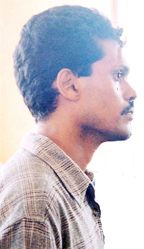By Oluatoyin Alleyne in New York
Confessed drug dealer Peter Morgan will now know his fate at the end of next month following the postponement of his sentencing which was originally set for yesterday in New York.
The matter was not called yesterday in Judge Edward Korman’s court as Morgan’s lawyer Allan Futerfas on Thursday moved to the court for the matter to be postponed. It is not clear what was behind the request but from all indications the prosecution and the defence might not have agreed as yet on a sentencing memorandum as none has been filed with the court. Sentencing is now expected on November 30.

When Morgan pleaded guilty in June he waived his rights to an appeal and the judge told him that he faced the minimum of 10 years in prison and the maximum of a life sentence.
The drug dealer had told the court that he fully understood what he was doing and he was asked to explain what he did at his plea hearing. He told the court that between December 2001 and August 2003 he conspired, with David Narine, to get cocaine in and out of Guyana and that he was fully aware of his actions and his conduct. He said he agreed with Narine to import cocaine into the US.
Morgan, 42, was facing a three-count indictment which accused him of conspiring to import, possess and distribute five kilogrammes of cocaine between December 2001 and August 2003.
He was nabbed in March 2007 in Trinidad by Trinidadian and US authorities while he was in-transit at the airport. He was extradited to the US on August 23, 2007, after he withdrew a last-ditch appeal he had made in the Port of Spain Appellate Court. Morgan had initially attempted to have the extradition order issued by Trinidad Chief Magistrate Sherman McNicolls on April 30, 2007, reversed. His lawyers had appealed but this was dismissed in the High Court and then a new appeal was filed.
According to one of the charges Morgan faced, some time between October 1, 2001 and August 31, 2003, he knowingly and intentionally conspired with David Narine, Susan Narine, Hung-Fung Mar and other persons unknown, to traffic in cocaine by importation. The second charge, which he did not plead to, alleged that some time between December 1, 2001 and August 31, 2003, he trafficked in cocaine by importation.
David and Susan Narine, along with William and Savetree Narine, were charged since in 2003 with conspiracy to import and conspiracy to possess narcotics in the US.
David Narine, who was expected to play a key role in Morgan’s case, is expected to be sentenced on November 13 along with his wife Susan after pleading guilty. David also has to complete part of a sentence he was serving in Guadeloupe.
William Narine was found guilty last month and was sentenced to time served and five years supervised leave while his wife Savitree was also sentenced to time served back in 2005.
Earlier this year Morgan had argued that the only reason he and his relatives travelled with large sums of foreign currency was because he benefited from favourable exchange rates using Guyana dollars to purchase foreign currency, which was then used to pay overseas suppliers of his company, Morgan Auto Sales.
In the memorandum filed through his lawyer Futerfas, Morgan had said that for almost 20 years he used market fluctuations to trade for profit in currency, as the unusual economic conditions in Guyana forced most businessmen in this country to pay vendors in other currencies. He said that his business, which was established in 1991, utilised the New York bank account of Sabena Manufacturing, established by his father James Morgan at the JP Morgan Chase Bank way back in 1985. Since the establishment of that bank account, Morgan and his relatives made over 60 trips to the US, carrying large sums of US and Canadian dollars along with British pounds totalling millions of dollars, all of which were declared.
The JP Morgan Chase Bank account has since been closed by US authorities and the proceeds given to the state.
